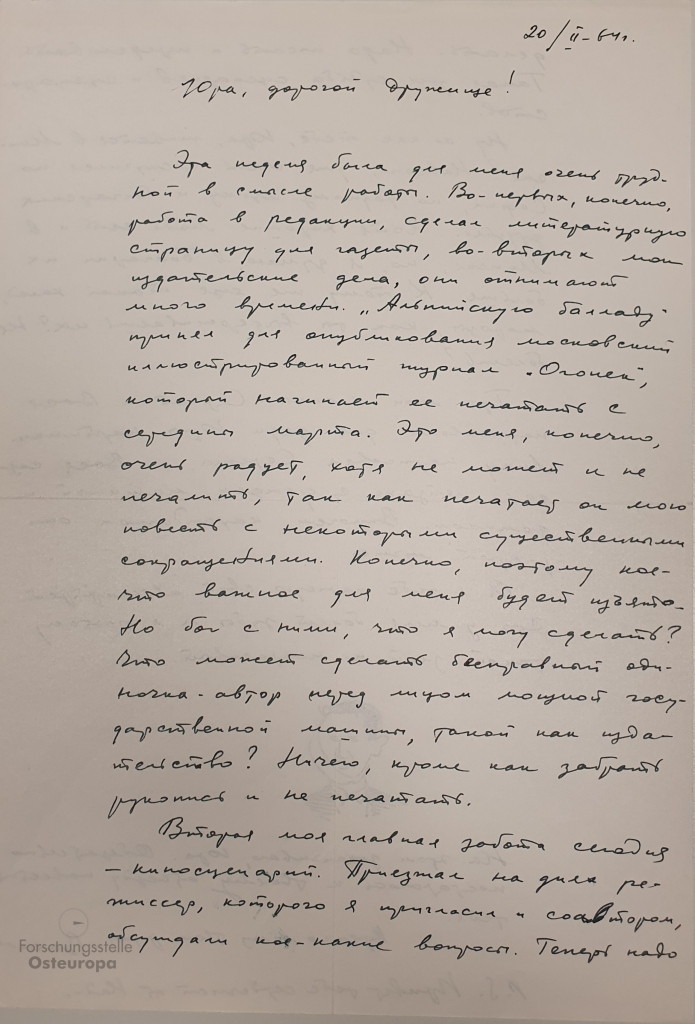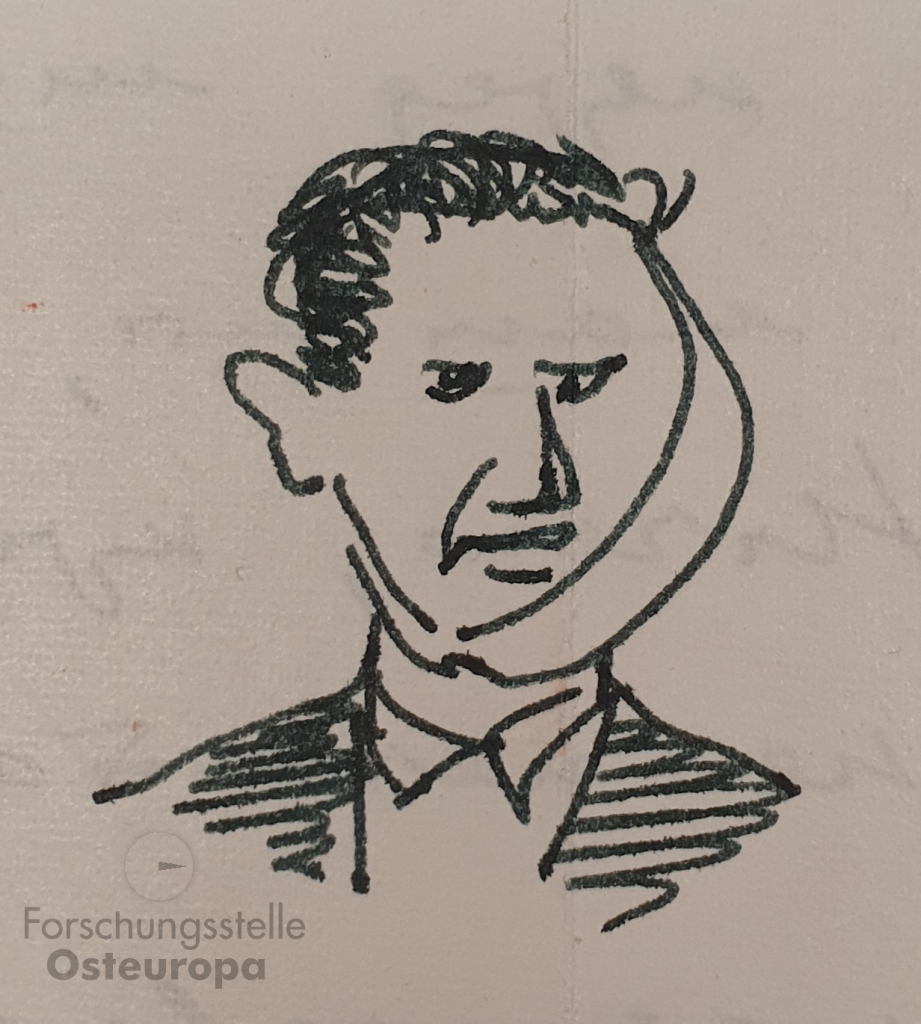"Unissued Diplomas"
17:00, Europapunkt Bremen
Ausstellungseröffnung
17:00, Europapunkt Bremen
Ausstellungseröffnung
Buchvorstellung
18:00 Uhr
Annette Schuhmann
Wir sind anders! Wie die DDR Frauen bis heute prägt.
Buchvorstellung
18:00 Uhr
An Evening with Maksym Butkevych
Europapunkt
18:00 Uhr
An Evening with Maksym Butkevych
Europapunkt
Wissenswertes
„Yura, my dear friend!”
The Letters of Vasil Bykaŭ to Georgi Vlchev – a unique document of a true friendship amidst the Cold War.

Letter from Vasil Bykaŭ to Georgi Vlchev, February 20, 1964. Archive of the Research Centre for East European Studies. Photo: Muriel Nägler.
In 1961, at the heyday of Khrushchev’s Thaw, the Bulgarian literary scholar and translator Georgi Vlchev visited Soviet Belarus. During his visit, in Hrodna, he met a journalist and a promising young author named Vasil Bykaŭ. This is where the story of this extraordinary, decades-long friendship started. The Kostezkyj collection of the Research Centre for East European Studies Archives preserves a unique selection of Bykaŭ’s letters to his Bulgarian friend and colleague, which Vlchev carefully stored over years.
Yet what is so special about this correspondence? The name of Vasil Bykaŭ has been associated with a major shift in Soviet war prose, away from ideologic clichés towards an individual human experience of tragedy and brutality of the war. The correspondence that continued over 27 years echoed, year by year, month by month, Bykaŭ’s stubborn struggle for his unique writing style and his commitment to “the black bread of truth” in literature. This way was by no means straightforward or heroic. In these letters, we encounter Bykaŭ as he was: with all his doubts, his pessimism, concessions he made, yet also with his extraordinary courage and ability to move forward despite all the circumstances, constantly testing the moral and aesthetic value of his work, of which Bykaŭ was perhaps the first and the most rigorous critic. “Thus [I] have been writing a lot, but it [the result] does not satisfy me, I have to admit, [I am] continuously thinking, [that I am] not writing the way it should be, [but] weaker and worse” – confessed the Belarusian writer in his very first letter in 1961.

Self portrait of Bykaŭ, 1964. Archive of the Research Centre for East European Studies. Photo: Muriel Nägler.
Bykaŭ had special feelings for Bulgaria, because there he spent his first post-war year, as a young 21-year-old Red Army lieutenant. The euphoric reminiscence of the first year of peace after the long and devastating war and the otherness of Bulgarian life remained with him for a long time. He was in love with the culture and the people of Bulgaria. Bykaŭ dreamed of visiting the country again, and Vlchev eagerly supported these intentions. Yet the press and the communist party officials' attacks on Bykaŭ after his publication of the novel 'Dead Have No Pain' (Mertvym ne balits’) in 1965/1966 had almost put an end to these plans. In contrast to many other renowned Soviet writers, Bykaŭ was not bestowed with a particularly privileged position, but on the contrary, was often treated with suspicion by the authorities. Yet thanks to Georgi and the other great supporter of Belarusian culture, Bulgarian translator Naiden Vlchev, Bykaŭ could visit Bulgaria once, even if much later than planned. The situation changed only in 1984 and 1986 after Bykaŭ received the Lenin Price and the Socialist Hero Award. These awards coupled with the relaxation of Gorbachev’s perestroika allowed him to travel across Europe more freely.
These letters are more than a chronicle of one great friendship, they are a document of an arduous work of defending one’s creative freedom under every circumstance, with all the ups and downs that accompanied by this process, of a courageous will to acknowledge one’s own vulnerability as an author and as a human being.
Tatsiana Astrouskaya
Further reading:
Gimpelevich, Zina J.: Vasil Bykaŭ. His Life and Works, Montreal 2005.
Lewis, Simon: Belarus - Alternative Visions: Nation, Memory and Cosmopolitanism, London 2018.
Tatsiana Astrouskaya is a Digital and East European Historian. She is the author of "Cultural Dissent in Soviet Belarus (1968-1988). Intelligentsia, Samizdat and Nonconformist Discourses". Since 2018, she works at the Herder Institute for Historical Research on East Central Europe in Marburg and since 2022 teaches at the University of Giessen.
Länder-Analysen
Die Länder-Analysen bieten regelmäßig kompetente Einschätzungen aktueller politischer, wirtschaftlicher, sozialer und kultureller Entwicklungen in Mittel- und Osteuropa sowie Zentralasien. Alle Länder-Analysen können kostenlos abonniert werden und sind online archiviert.
» Länder-Analysen
» Eastern Europe - Analytical Digests
» Länder-Analysen
» Eastern Europe - Analytical Digests
Discuss Data
Archiving, sharing and discussing research data on Eastern Europe, South Caucasus and Central AsiaOnline-Dossiers zu
» Erdgashandel
» Hier spricht das Archiv
» Russian street art against war
» Dissens in der UdSSR
» Duma-Debatten
» 20 Jahre Putin
» Protest in Russland
» Annexion der Krim
» sowjetischem Truppenabzug aus der DDR
» Mauerfall 1989

